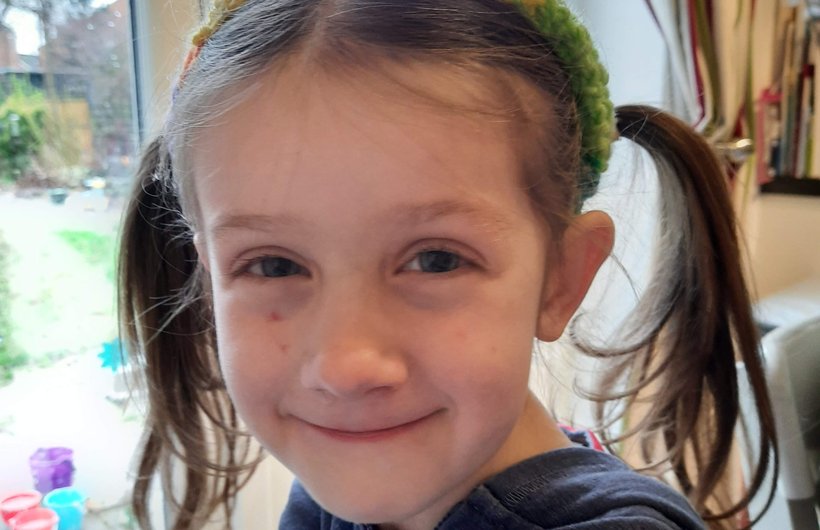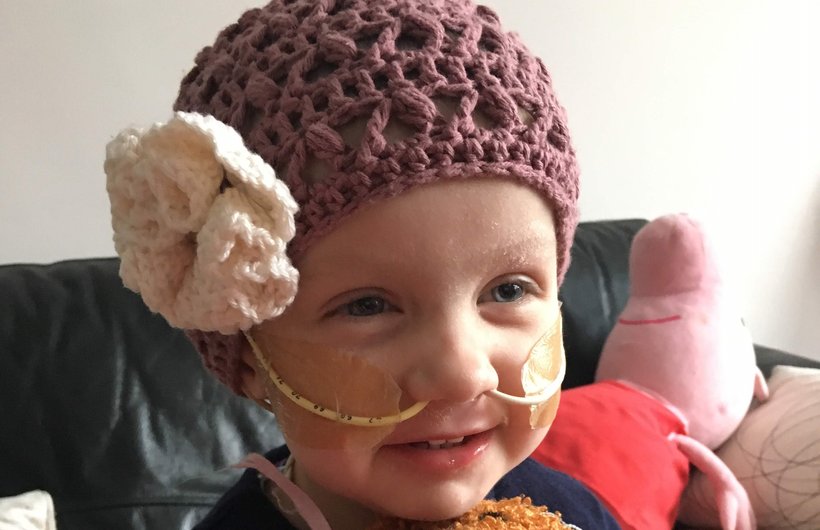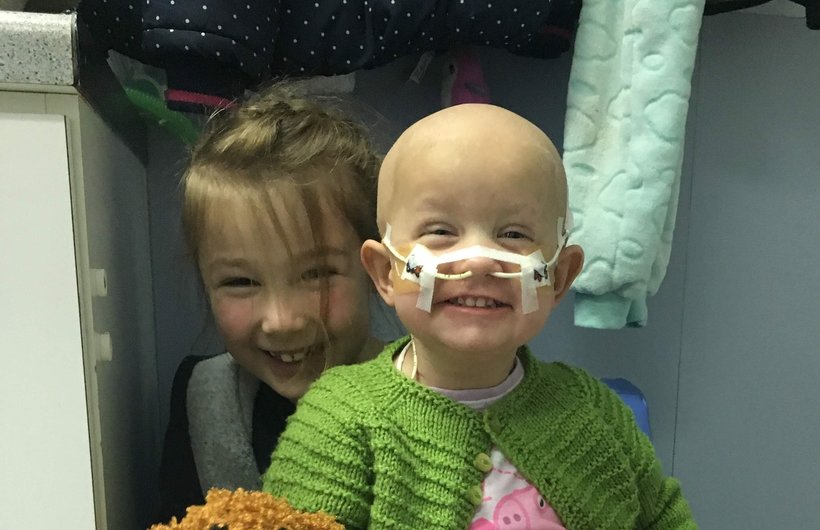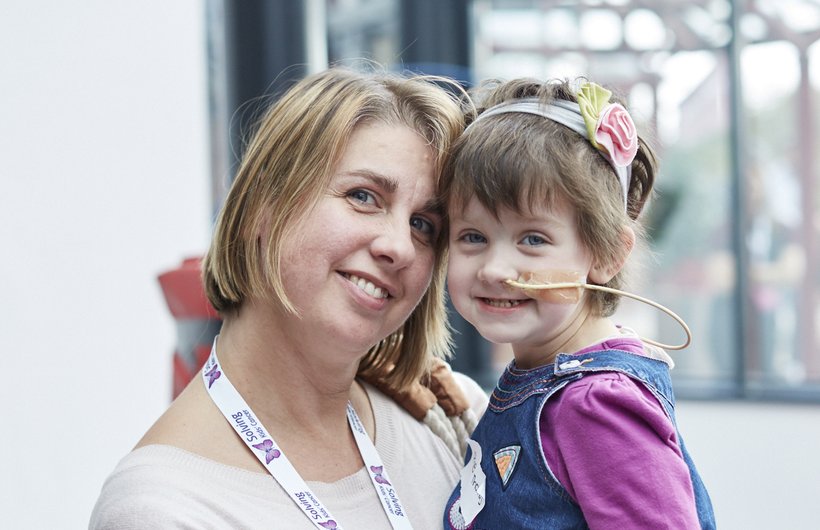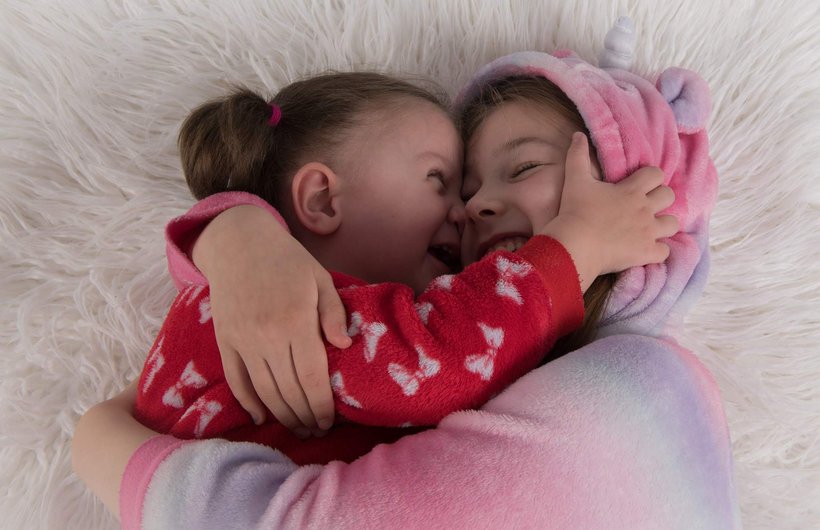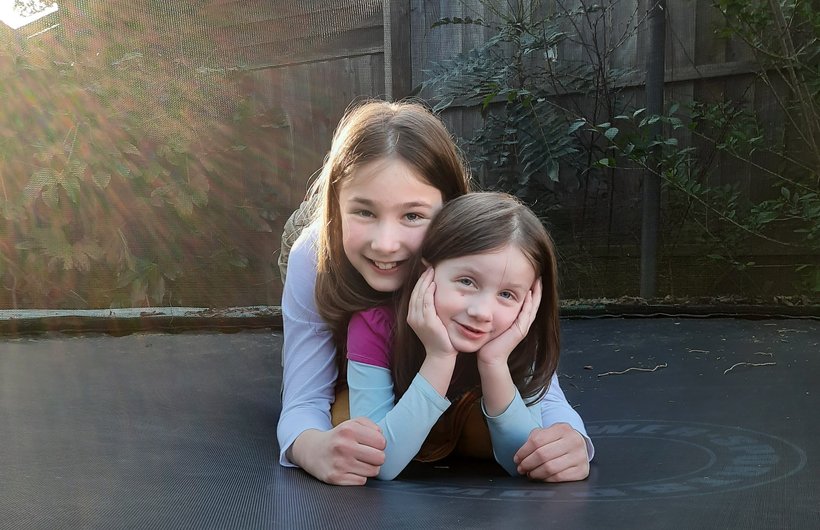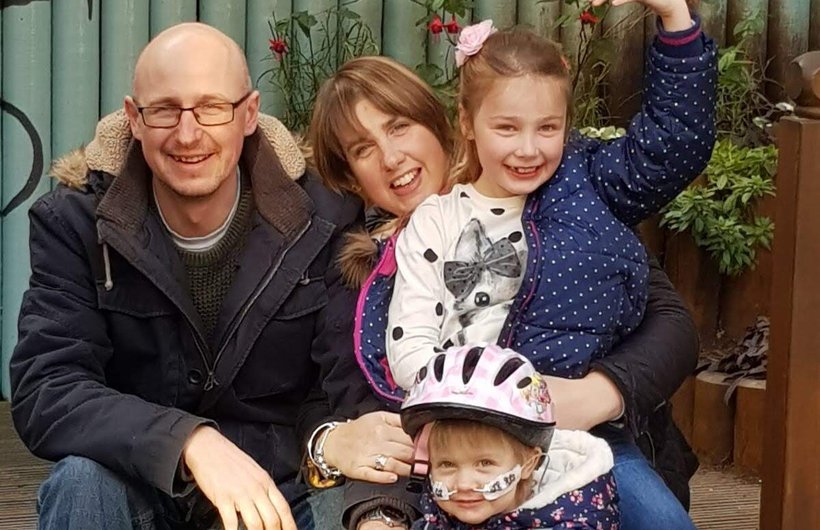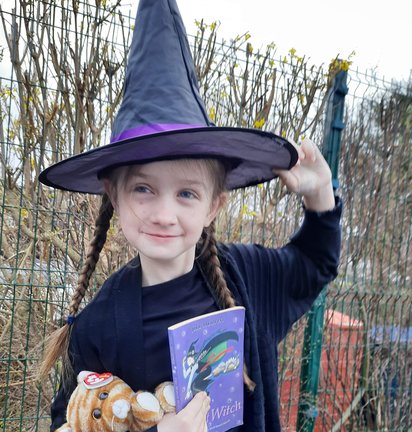

Phoebe
Phoebe was diagnosed with neuroblastoma when she was nine months old. She is funny, inspiring, cheeky, determined and very cute. She adores her big sister Amelie, who loves her to bits.
"Phoebe endured almost four years of treatment with a smile on her face despite all she was going through. Treatment has left her with hearing loss and some other issues but she is growing and thriving, just being an 8 year old who loves books, Brownies and swimming."
Phoebe's mum, Naomi
Phoebe’s story
In October 2015, following what seemed to be a normal cough and cold, Phoebe developed a small lump on her chest. After a couple of visits to the GP, he referred her to see a specialist. When the appointment came through for January, and more lumps had appeared (now seven in total), the GP sent Phoebe to A&E where her parents were told that these were most likely to be developmental cysts.
Phoebe was suffering increasingly with constipation and vomiting, however being nine months old her parents didn’t think this meant anything serious was wrong. In the week leading up to Christmas, the vomiting became more frequent and Phoebe’s sleep became more and more disturbed; her parents thought she was either teething or constipated. Over Christmas, her tummy gradually started to become distended, and by New Year several family members had commented on how large it looked. Phoebe’s mum turned to Google and found herself reading symptoms of neuroblastoma – a word and illness she had never heard before. She quickly shut it down telling herself off for being a paranoid parent but read the words, “the prognosis is good if found in a child under 12 months”.
Phoebe’s scan, to confirm the diagnosis of developmental cysts, was scheduled for 4th January 2016. Both parents had to hold her down whilst they performed it, she was so distressed. Then came the moment when everything stood still – “I’ve found something”, the radiographer said. “I think I know what it is but she needs a chest X-ray… the good news is that the prognosis is good because she’s under 12 months.” Phoebe’s mum instantly knew what it was, it was the thing she had told herself it couldn’t be – neuroblastoma. Phoebe then had an X-ray, and her parents were told they needed to talk to a specialist, who appeared shortly after. In the makeshift consulting room, surrounded by scanning equipment Dr Visser introduced himself, “I’m from the children’s cancer team”, and at that point, their whole world fell apart.
“That night, we clung on to some vain hope that it wasn’t that bad, it couldn’t be, the prognosis was good because of her age. Our little family which was so perfect was being turned upside down. What did the future hold? We were so scared. We took it in turns to try and be strong, determined that as long as one of us was holding it together, we could get through.”
Phoebe’s parents, Naomi and Russell
A few days later, Phoebe’s parents were told that the tumour inside of her was so big and dangerously close to her kidney that they needed to start chemotherapy as soon as possible; they couldn’t wait for biopsy results to confirm the nature of her cancer. “Without the biopsy results, they couldn’t be sure but were still hoping that it would be classed as neuroblastoma 4s, which in children under 12 months can disappear of its own accord.”
When the biopsy results came back Phoebe's family were told the tumour completely filled her abdomen. It stretched right across her body, pushing her lungs up and her kidneys and liver down. It was remarkable that her little body was still functioning at all with that inside.
Phoebe completed six rounds of chemotherapy in early 2016 and responded very well. The tumour reduced to about half of its original size and they were told that the tumour was expected to shrink by itself as is common with neuroblastoma 4s. This could take a couple of years and she would have scans every three months to monitor what was happening. Phoebe had begun to thrive, started to grow and put on weight. She had one skin lump left and her liver was clear. Phoebe’s mum, Naomi, says: “We felt extremely lucky, I often felt like we shouldn’t be on the oncology ward, how could a cancer that goes away by itself even be a cancer? I felt guilty when looking at the other children around us.”
However, just a week before the next scan, Phoebe’s mum thought the lump that was left on her skin had grown. She alerted Phoebe’s consultant, who promised to get the results quickly. At 9am the morning after the scan, he rang to confirm that the lump had grown, along with the main tumour - it had now spread to her shoulder and head. Her parents say: “The bottom fell out of our world again. This was really serious."
Beginning treatment for high-risk neuroblastoma
On 1st October 2016, Phoebe began treatment for stage 4 high-risk neuroblastoma, commencing with intense chemotherapy – eight rounds, every ten days, regardless of how her blood counts were or how unwell she was feeling. Towards the end of November, after six rounds of chemotherapy, she ended up in an induced coma in intensive care with kidney failure and sepsis. Due to this, Phoebe could no longer have one of the chemotherapy drugs so she moved off the standard treatment protocol and used a different combination.
She was to do two cycles of this new combination, which would hopefully get her back on track but in February 2017, the next set of scans showed that there was another new spot behind her eye and that the other areas had not responded to treatment. In March 2017, Phoebe started on the BEACON trial (a new combination of chemotherapy drugs) at Birmingham Children’s Hospital, which was an 88 mile round trip from home. Her parents needed this to work. Phoebe responded well initially and then became stable, so was in a position to continue with other treatment to try to beat her neuroblastoma for good.
In October 2017, she underwent 12 hours of surgery, which was successful in removing the main tumour. Following a lengthy recovery, she had high-dose chemotherapy followed by stem cell transplant. After spending 106 days in Birmingham Children’s hospital and two spells in PICU due to complications and side effects of the high-dose chemotherapy, Phoebe was finally allowed home.
But only a few weeks later, in March 2018, scans showed that once again the cancer had grown and spread. It had survived the high-dose chemotherapy that was meant to obliterate it completely. Plans for radiotherapy were cancelled and it was back to the drawing board.
"This time we knew that traditional treatment and chemotherapy would not work, her disease was too resistant. We needed to think outside the box. Thankfully, there were options."
Phoebe’s parents, Naomi and Russell
"The problem was some trials were yet to open and then MIBG therapy was ruled out. It did start becoming limited. Phoebe’s case was reviewed by the national neuroblastoma advisory panel, and Professor Pam Kearns (our consultant) came back with encouraging news – Phoebe’s tumour had the ALK mutation and the general consensus was that we should try to access an ALK inhibitor," says Naomi.
This drug was not licensed for children and was still being trialled in adults but was showing promise. This needed to be applied for direct to the pharmaceutical company under compassionate use grounds and thankfully it was approved.
The ALK inhibitor drug worked in stopping the progression of her disease and after 12 months we took the scary decision to come off the drug and for Phoebe to receive immunotherapy, which had now become a standard part of frontline treatment. It was after two cycles of the immunotherapy that the family received the first clear MIBG scan indicating that, although there were areas of disease remaining these were no longer ‘active’ and were considered to be dead. This was such huge news for the family as it had felt so far out of reach for so long. It had taken 1,254 days (almost 3.5 years).
Amazingly, Phoebe has coped incredibly well with everything that has been thrown at her. Her parents know this is a long road and she has not followed the textbook. Her disease has been resistant to treatment, and they have seen time and time again just how sneaky neuroblastoma is. They know that in the future Phoebe may need to access treatment that isn’t available on the NHS, and that they need to be prepared should this be the case.
“Our hope and dream is that she will grow up finally free from this disease and with few side effects.”
Phoebe’s parents, Naomi and Russell
Solving Kids' Cancer UK's children's fundraising campaigns
Funds raised will go towards helping Phoebe should she need further treatment not available through the NHS. Phoebe's cancer, high-risk neuroblastoma is aggressive with high rates of relapse. At relapse, the chance of survival is extremely low. If Phoebe no longer needs the funds or is in remission five years post the end of treatment, the funds will be used to support other children and families affected by neuroblastoma through our activities.
Donations and comments
Paul Bainger£30.00
Donated on: 11th June 2025
Pat Grant£20.00
Donated on: 10th June 2025
In memory of Victor, Phoebe’s grandad. RIP Victor
Jo Hockton£30.00
Donated on: 8th June 2025
In memory of Phoebe's grandad xx
Jo Hockton£80.00
Donated on: 8th June 2025
From Karl Webster - thank you!
Tracey Ampaw£100.00
Donated on: 3rd June 2025
In memory of Phoebe’s wonderful Grandfather and our very special Uncle Victor RIP Love Tracey Richard India and Kai x
Karl Webster£100.00
Donated on: 8th April 2021
Anonymous£167.07
Donated on: 24th January 2020
Manual Adjustment
Anonymous£70.00
Donated on: 20th January 2020
Anonymous£20.40
Donated on: 24th December 2019
For Phoebe Thomas
Anonymous£83.32
Donated on: 21st November 2019
Manual Adjustment
Anonymous£1,234.95
Donated on: 1st November 2019
Anonymous£10.20
Donated on: 1st October 2019
Know the mother and grandparents and want to support them!
Anonymous£550.40
Donated on: 1st October 2019
Manual Adjustment
Anonymous£27,926.00
Donated on: 12th August 2019
Previous donations to Solving Kids' Cancer

